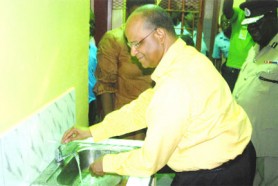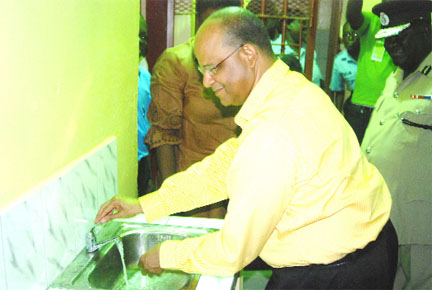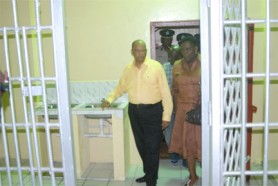The Brickdam lock-ups were yesterday re-opened after a $14.4M facelift to make it more habitable for detainees, whose experiences led to calls for it to be closed.

In declaring the facility open, Home Affairs Minister Clement Rohee said the lock ups could be ranked among the better ones in the Caribbean. He noted that they have been at the forefront of the debate of the treatment of detainees and have always been a focal point of discussions, principally because they are located in the largest police station compound and the largest police division. “The condition of these lock-ups were never a reflection of the conditions of lock-ups at other police stations across the country, yet this reality was never accepted,” Rohee explained, while observing that, “as the saying goes, one horrible lock-ups makes all lock-ups horrible.”
‘A’ Division Commander George Vyphuis referred to the lock-ups as “Princess B” and a tour yesterday revealed a clean facility with functioning toilets and showers, although there was poor ventilation. The humid conditions were due to the fact that air could only get in through very small meshed covered windows of the concrete building.
According to consultant Noel James, the renovations included the installation of 15 panel-ware toilets for the cells at a cost of US$700 each, and fabrication and installation of metal bunks for each cell. The holding area was also refurbished; seating accommodation was constructed while the enquiries area was tiled and painted. Toilets and baths were also added and the entire lock-up was re-painted. James also explained that renovations were also done to the existing grill door framing and the defective concrete walls, which were re-plastered. New plumbing was installed to each cell while a concrete reservoir was constructed and other ancillary works were done.
According to Rohee, who himself was detained in the facility on two occasions when the PPP was in opposition, police lock-ups are an integral part of the law enforcement arrangement in the country, as they assist the police in maintaining peace and good order in society. However, he added that there is a fundamental difference in the “cry by many to ‘lock he up’ or ‘jail he’ in the demand for justice or peace in one situation or another.”
He said for many citizens, locking-up gives them a sense of justice, which is a “popular sentiment that must be taken into to account when judgment is being exercised by the police….”
But Rohee warned that the police must be careful when executing their duties and mentioned a recent case involving two retired teachers on the West Bank of Demerara, where police barged into their home one morning.
The minister said that he has since offered an apology to the couple, who gave the country over 60 years in service, and he urged Police Commissioner Henry Greene and the commander to follow suit. “Let me emphasise that while honourable, competent and fair performance by the police is no guarantee for public confidence, the force cannot give up the fight to win the support of the public it is an ongoing battle…” he said.
The renovation of the facility began late last year, after its insanitary state came under the national spotlight. Many persons who had spent time in the lock-ups described it as an experience they would not wish on anyone. In the interim, prisoners were housed at the Diamond Police Station lock-ups.
In January 2002, Chairman of the Bar Council of England and Wales, Lord Daniel Brennan QC recommended that the facility be shut down, after a visit to Guyana that was aimed at improving the local judicial system.
During his visit, Lord Brennan met with members of the judiciary, the police force and the prison service. He also toured the Camp Street Prison calling it a “reasonable” facility, but said that the Brickdam lock-ups should be “locked up and closed.”
At last year’s opening of the annual general meeting and conference of the Association of Caribbean Commissioners of Police (ACCP), Caricom Assistant Secretary-General Dr Edward Greene spoke about the dehumanising conditions under which persons are detained. He had said such conditions “epitomise the abuse of their human rights,” which has “serious implications for the image of the police and the legitimacy of their role as one of the agencies of human and social development.”


